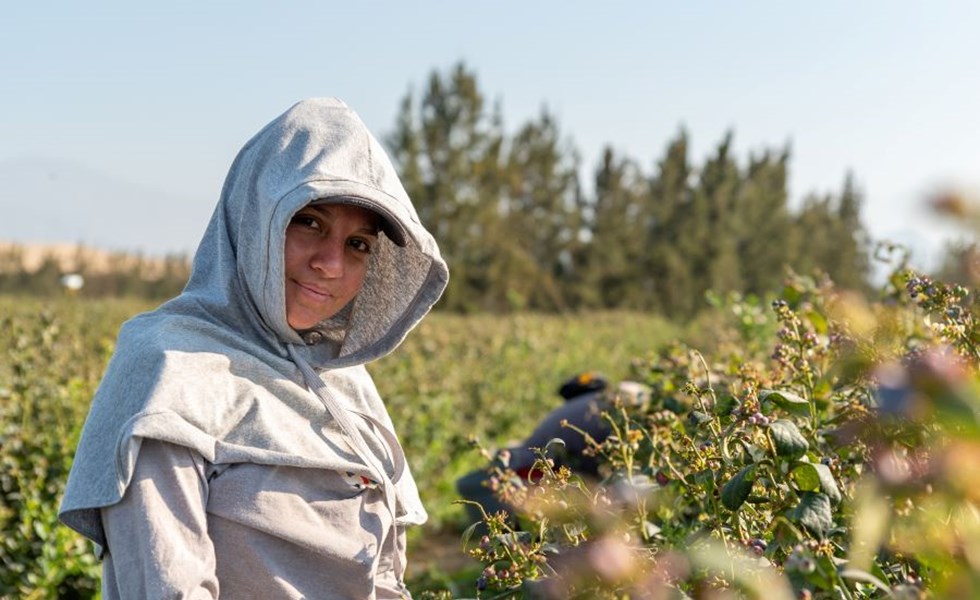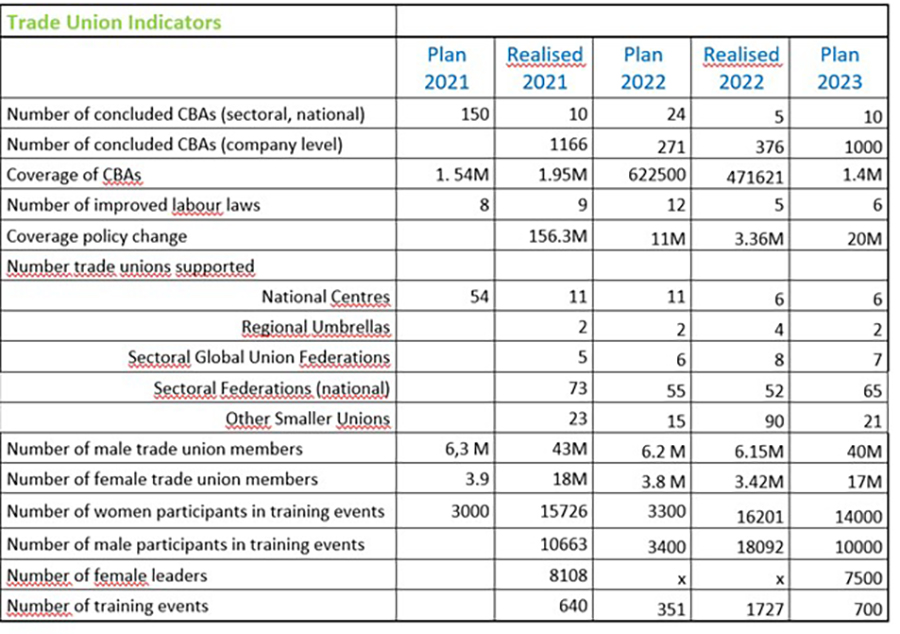Results of the Trade Union Co-financing Programme
In a bird’s eye view
Mondiaal FNV receives funds from the Trade Union Co-financing Programme (TUCP). This is a Dutch Ministry of Foreign Affairs programme, and its aim is to strengthen trade unions in low- and middle-income countries. Below we present some results of this programme in a bird's eye view.

Woman harvesting blueberries in Peru. In the fruit and vegetables programme in Peru, partners concluded four new company collective agreements. Photo: Roderick Polak
Below we present an overview of results following the indictors that were agreed and the projections that were given in the overall TUCP plan and in subsequent annual plans and the 2021 annual report.
Explanation of the table
Intermediary Outcomes
The number of sectoral CBAs was concluded in the following programme areas: 3 in East African construction (Kenya, Tanzania), 1 in flowers (Uganda) 1 in Palm Oil Indonesia, and one in leather, Bangladesh.
Newly agreed company level CBAs were reported as follows: 14 in East Africa’s construction, 210 in Ethiopia’s social dialogue 12 in Colombian palm oil, 12 in Rwanda’s social dialogue, 6 in palm oil Africa, 6 in construction MENA, 4 in Peru fresh fruits and vegetables programme. A relatively high number is reported from Ethiopia, accounting for over 60% of total number of CBAs reported. From other countries, lower numbers than expected are attributed to more difficult economic times where inflation eats into budgets of both unions and employers.
Improvements in labour laws were reported from Rwanda, (three counts, on OSH, tax exemption of low incomes and maternity leave). Provincial level minimum wage increases lobbied for in Indonesia were counted as 6 and for international comparison, have here been totalled as 1 “national level” change. Policy changes in Colombia, Indonesia and Ethiopia were delayed for various reasons. An important law change in India, especially in view of the theme of Gender Equality, was the increase in marriageable age of women to 18 years. However, as this is not mainly related to the world of work, we decided not to count it in the above frame-work of TUCP indicators.
Reach
Mondiaal FNV directly supports 6 national trade union centres and coordination bodies: CETU (Ethiopia), NOTU (Uganda), CESTRAR (Rwanda), JTUCC (Nepal, a coordi-nation mechanism between 10 national centres in that country), GTUC (Ghana); and CUT (Colombia), which are administering the coordination of trade unions in the palm oil sector.
Mondiaal FNV supports four regional umbrellas of trade unions. In Africa these are EATUC for the East African Community, and ITUC-Africa. ITUC-Africa represents 101 trade union centres in 51 countries, but we only support their work with two countries, namely Burkina Faso and Sierra Leone. In Asia we work with two large South Asian umbrellas, the South Asian Regional Trade Union Congress (SARTUC) and the National Alliance for Social Security in India (NASS). Both networks boast over 33 million members, our projects focus on national level networking and agreement in the field of migration (SARTUC) and social security access for informal workers (NASS). Both ITUC-Africa and the South Asian regional umbrellas have been left out of the counting of TU-membership in the table above, which explains the difference from 2021 “realised” and 2023 “planned” data.
For regional coordination and trade union strengthen-ing in areas where direct support to smaller unions is not feasible, Mondiaal FNV works with eight global union federations: EI (Education), IFDW (Domestic Workers), PSI (Public Sector), UNI (Services sectors), BWI (Construction and woodworkers), ITF (Transport), IUF (Agriculture, Food, and Hospitality sectors) , IndustriALL (Industry, Manufacturing and Mining).
Via these GUFs, Mondiaal FNV supports some 40 sec-toral federations. Furthermore, Mondiaal FNV supports a number of national sectoral federations bilaterally, including STECOMA (Construction, Rwanda), EIFCMWCOTU (Ethiopia), UHISPAWU (Flowers, Uganda), NFFPFATU (Flowers, Ethiopia), Sintracarbon (Coal mining) in Colombia. Some other sectoral federations are supported via foundations, the so-called Labour Resource Organisations (LROs), including the local textile and leather sectors in Bangladesh, the palm oil unions in Indonesia, most Indian partners, and FENTAGRO in the agro-export sector of Peru.
Output
Mondiaal FNV supported 1727 training events, attended by over 16 thousand women and 18 thou-sand men. A very large number of training events is reported from Bangladesh (1220), where larger trainings were downsized to topics that could be discussed in one-hour sessions in small study circles, to prevent workers from long travel and days of absence while being trained by the union, as an adjustment to long working hours in the textile workshops and leather factories.
The number of women participants was higher than last year, but lower than the number of male participants. A very large number of trained women (9220) was reported by SEWA in India in the downstream ship-breaking activities, a number which is to some extent counteracted by the huge number of men trained in the Bangladesh local textiles and leather projects (9270).
At the level of supported unions, a total of 1,440 male trade union leaders was reported, counteracted by only 270 female leaders, or 15%.
No results without fine-grained networks and trade unions
None of the results recorded by Mondiaal FNV and its partners would have been possible without dedicated members willing to take on the struggle if necessary, dedicated leaders who are willing to face the often strong opposition and anti-union tactics of employers and governments. A strong contributing factor to the successes presented in this report is also the fine-grained democratically governed network and presence of unions: From the factories and plantations levels up to national capitols, regional forums and the international global level.
Scroll door het jaarverslag
